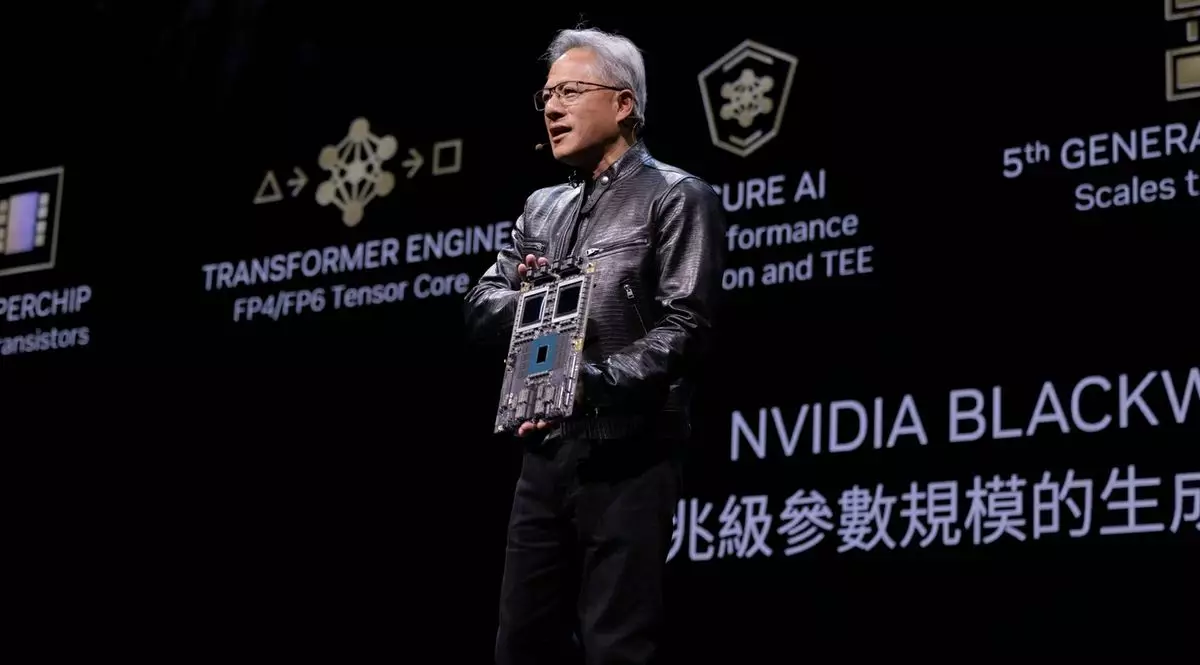In today’s fast-paced technological landscape, the role of a CEO has evolved into a multifaceted powerhouse of responsibility, especially for industry leaders like Jens Huang, the CEO of Nvidia. As the company surges to the forefront of AI hardware development, the stakes have never been higher. Huang’s recent remarks at the Goldman Sachs Communacopia + Technology Conference reveal a nuanced understanding of not just the exhilarating opportunities that lie ahead but the immense pressures that accompany them.
In an industry where every decision has profound implications, Huang acknowledged the magnitude of the responsibility that he and his team shoulder. Nvidia collaborates with numerous high-profile tech companies, positioning itself as a linchpin in the burgeoning AI ecosystem. Huang noted, “Our company works with every AI company in the world today… I don’t know one data center, one cloud service provider, one computer maker we’re not working with.” This vast network reflects not only Nvidia’s significance but also the intricate dynamics of dependency among tech giants.
When the success of numerous companies hinges on Nvidia’s products and services, the emotional stakes rise dramatically. Huang’s insight into the feelings of their customers underscores a fundamental truth about technology: it is not merely about hardware and software but also about relationships and trust. The “enormous responsibility” he mentioned indicates that every shipment and every line of code can directly impact the success—and survival—of other firms. This emotional landscape creates a unique environment where innovation and pressure coexist.
The demand for Nvidia’s Blackwell AI GPUs epitomizes the current competitive atmosphere. Huang’s admission that they received tens of thousands of orders even before the product was announced is telling of the appetite for advanced AI solutions within the market. The intensity of this demand inevitably translates into an enormous burden on both Huang and his team. The phrase “everybody wants to be first, everybody wants to be most” illustrates a prevalent mindset in tech: one where delay can mean missed opportunities and lost market share.
This relentless pursuit of innovation places Nvidia on a thrilling yet precarious tightrope. The company must balance rapid development with quality assurance, navigating the dual challenge of meeting customer expectations while ensuring reliability and performance. In such a high-stakes environment, mistakes can come with devastating consequences—not just for Nvidia, but for the entire tech landscape reliant on its advancements.
Despite the pressures, Huang’s comments reveal an underlying passion that fuels his leadership. He expressed excitement about inventing the “next computer era” and witnessing the unfoldment of groundbreaking technologies. “It’s fun to see all these amazing applications being created,” he said, encapsulating a sense of wonder that contrasts sharply with the myriad challenges he faces. This perspective serves as an important reminder that amid high-pressure situations, the thrill of innovation can be a powerful motivator.
Moreover, Huang’s approach to sleep—or the lack thereof—further highlights the nature of work at the top of such an influential company. “Less sleep is fine, and three solid hours, that’s all we need,” he mentioned. This somewhat audacious attitude raises questions about work-life balance in executive positions. The implications of sacrificing personal well-being for professional aspirations are significant and merit scrutiny, especially in an era increasingly aware of mental health issues.
Looking ahead, Huang confidently stated that the Blackwell AI GPUs would begin shipping in the fourth quarter of this year and reach increased scaling in the following year. The anticipation surrounding their release speaks to the broader trends within the industry—a testament to the growing significance of AI in both corporate strategies and everyday applications.
As Nvidia charges forth into an uncertain yet promising future, it does so with an understanding of the dual-edged sword of success. With every achievement comes an accompanying challenge, the need for strategic foresight, and the vitality of maintaining strong relationships with clients. The road of tech innovation may be fraught with obstacles and extensive pressures, but as Huang’s journey illustrates, it is also filled with opportunities that can redefine human experience and capability.
Navigating the currents of AI development is a strenuous yet exhilarating endeavor. For leaders like Jensen Huang, the task goes beyond mere product delivery; it involves cultivating trust, fostering innovation, and ultimately guiding the industry through an unprecedented technological renaissance.

